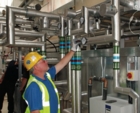Oventrop valves serve new equine hospital

Oventrop valves were odds-on favourite for this new equine hospital at Newmarket.
The large and modern private equine hospital at Newmarket has its heating system regulated exclusively by Oventrop valves, chosen and installed by mechanical-services contractor Dodd Group Eastern. Newmarket Equine Hospital is near the July racecourse and claimed to be the largest and most modern such hospital in Europe. The heating system designed by consulting engineers LAM Associates is based on a main plant room with two boilers. One is oil fired, and the other burns wood pellets. All the isolating valves for the boilers and ancillaries were supplied by Oventrop. LPHW is distributed around the site through a pair of underground flow and return mains which surface in a ‘wet’ plant room in the hospital building. This plant room has a low-loss header and distribution pumps for the circuits supplying radiators and air-handling units. 80 radiators are fitted with Oventrop presettable AV6 thermostatic radiator valves and matching lockshields. At strategic locations, Hydromat differential-pressure controllers improve the dynamic balance of the system. Three other internal AHU plant rooms provide for heater batteries in other areas, all of which are regulated with Oventrop valves. Facilities include two operating theatres, four recovery rooms, X-ray rooms, laboratory, diagnostic room, offices and meeting rooms.
For more information on this story, click here:
Dec 08, 134Related links:
Related articles:


